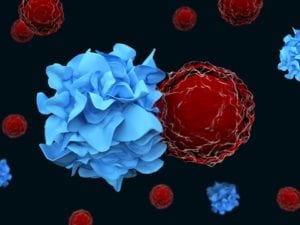New Mesothelioma Clinical Trial Will Test Personalized Immunotherapy
 A Dutch company has recruited the first patients into a pivotal mesothelioma clinical trial of autologous dendritic cells.
A Dutch company has recruited the first patients into a pivotal mesothelioma clinical trial of autologous dendritic cells.
Dendritic cells are immune system cells that work as messengers. They help tell T cells to attack cancers like malignant mesothelioma.
The new mesothelioma clinical trial will test using the patient’s own dendritic cells (autologous cells) as a way to keep cancer from coming back after mesothelioma treatment.
Expanding Mesothelioma Treatment Options
There is only one approved treatment for malignant pleural mesothelioma. This “standard of care” treatment is chemotherapy with Alimta (pemetrexed) and cisplatin. Although most mesothelioma patients receive this treatment, very few live longer than a year after diagnosis.
A Netherlands-based company called Amphera is trying to change those odds. Its new mesothelioma clinical trial is called DENIM (Dendritic cell immunotherapy for mesothelioma). It will include 230 pleural mesothelioma patients. To be in the Phase II/III study, patients must have already had mesothelioma chemotherapy.
Some of the patients in the mesothelioma clinical trial will get injections of MesoPher, Ampera’s dendritic-cell based treatment. These patients will receive three bi-weekly doses plus two more injections at weeks 18 and 30.
A second group of patients will only have best supportive care. Researchers will be recording the survival of both groups of mesothelioma patients.
There is already an ongoing MesoPher mesothelioma clinical trial for patients with peritoneal mesothelioma.
Mesothelioma Clinical Trial of Dendritic Cells
The MesoPher approach to mesothelioma treatment starts with removing some white blood cells in a process called leukapheresis. From there, researchers isolate immature dendritic cells and “program” them to present certain key antigens to the immune system.
When the dendritic cells are returned to the mesothelioma patient, they trigger an anti-tumor immune response. If it works right, NK-cells, B-cells, and T-cells start attacking the mesothelioma cells.
The goal of the new mesothelioma clinical trial is to measure that response and its impact on mesothelioma survival.
“The number of pleural mesothelioma patients is on the rise and to date there is only one therapy registered with limited clinical benefit,” Amphera CEO Rob Meijer said in a statement. “As such, new approaches to treating mesothelioma are much needed to improve the prognosis for these patients.”
MesoPher has already received orphan-drug status from the FDA and Europe’s EMA.
Source:
“Amphera recruits first patients to pivotal phase II/III study of MesoPher to treat pleural mesothelioma”, March 18, 2019, Amphera website, News release, https://www.amphera.nl/amphera-recruits-first-patients-to-pivotal-phase-ii-iii-study-of-mesopher-to-treat-pleural-mesothelioma/





